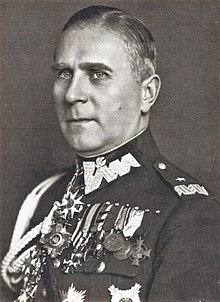Tadeusz Kutrzeba
Tadeusz Kutrzeba (born April 15, 1885 in Krakow , now Poland , † January 8, 1947 in London , Great Britain ) was a Polish division general in World War II .
Kutrzeba, son of a captain in the Imperial and Royal Army, first attended the Imperial and Royal High Schools in Fischau near Wiener Neustadt as well as in Mährisch-Weißkirchen from 1897, and in 1903 he graduated from a public secondary school in Vienna . He then studied at the kuk Technical Military Academy in Mödling (Lower Austria) until 1906 , where he graduated as the best of his year and lieutenant of the sappers. In the years 1906–1910 he served in the kuk sapper battalion No. 9 in his homeland, in Krakow . In the years 1910–1913 he completed a military engineering course at the kuk war school in Vienna and was promoted to first lieutenant in 1911. In the years 1913–1914 he served in Sarajevo in the Bosnian genius management, where he further developed the fortifications on the border with Montenegro ( Strafuni ).
During the First World War , Kutrzeba was used first in Italy , then from August 1916 in Transylvania and from June 1917 on the Russian front.
From November 1918 Kutrzeba served in the newly established Polish army , where he was first active in the general staff . In November 1919 he became chief of staff of the 1st Infantry Division , and in the same year he was promoted to major . In 1920 he was Chief of Staff of the 3rd Polish Army , which briefly occupied Kiev during the Polish-Soviet War . In August 1920 he took part as chief of staff of the 2nd Polish Army in the decisive battle on the Vistula against the Soviet troops under Tukhachevsky . He was then promoted to lieutenant colonel.
From January 1921 Kutrzeba taught tactics at the Academy of the General Staff , in December 1924 he became the second deputy chief of the general staff. He was promoted to colonel in 1922 and brigadier general in 1927 .
As one of the few in the Polish leadership, he understood the doctrine of the new war - the Blitzkrieg . At the beginning of the Second World War , Kutrzeba was the commander of the Armia Poznań army stationed in Greater Poland , which consisted of four divisions and two brigades . With this association (together with the forces of the Pomeranian Army (´Armia Pomorze´)) he succeeded in a counter-offensive ( Battle of the Bzura ) against the German Wehrmacht between September 9 and September 18, 1939 in the region around Kutno to be carried out, in which the front of the German 30th Infantry Division in particular was seriously threatened and the German 8th Army was forced to reorganize. The attack was carried out a few days late because the Polish General Staff - and primarily the Commander-in-Chief , Marshal Rydz Smigly - at first refused to accept the plan of the offensive. Instead, Kutrzeba's army was recalled to Warsaw and was in retreat for days between September 2 and 8, 1939. Among other things because of this delay and the superiority of the air force (the Polish air forces were only half operational at this point - approx. 200 aircraft - and could therefore no longer do anything against the German air force), but also because of the lack of relief from the Western Allies (France and Great Britain refused to stand by the embattled country, contrary to their contractual assurance) the Armia Poznań withdrew to Warsaw to take part in the defense of the Polish capital .
On September 28, Kutrzeba signed the surrender of the Polish armies in Warsaw and went with his soldiers into German captivity . He was u. a. imprisoned in Oflag VII A in Murnau . After the war he emigrated to Great Britain, where he died in 1947.
Kutrzeba received the Order Virtuti Militari three times , the Order Polonia Restituta twice and the Krzyż Walecznych (freely translated: Cross of Valor ) three times .
See also
- Armia Poznań (Army of Poznan)
- Polish army before World War II
- Battle of the Bzura
Web links
| personal data | |
|---|---|
| SURNAME | Kutrzeba, Tadeusz |
| BRIEF DESCRIPTION | Polish general |
| DATE OF BIRTH | April 15, 1885 |
| PLACE OF BIRTH | Krakow |
| DATE OF DEATH | January 8, 1947 |
| Place of death | London , UK |

